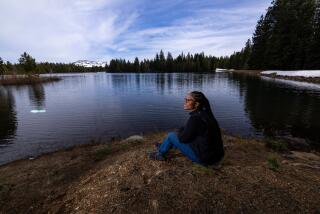Shoal Creek and Golf, One Year Later
- Share via
BIRMINGHAM, Ala. — Because of Shoal Creek, some ritzy golf clubs that once were the exclusive domain of whites count blacks among their members.
Because of Shoal Creek, the governing bodies of professional golf no longer stage their tournaments to be held at clubs that do not open their doors to all people, regardless of race.
But in spite of what happened when the PGA Championship was held at Shoal Creek one year ago, many of those involved say, golf remains a white man’s game, excluding minorities who lack the money or means to stroll lush green fairways hacking at a little white ball.
“I don’t think the Shoal Creek controversy has really caused any serious changes,” says Calvin Peete, one of only two blacks who play regularly on the PGA Tour. “There are still a lot of clubs with discriminatory policies, whether those clubs are open to blacks are not.”
Shoal Creek, an intensely private club nestled behind iron gates in the rolling hills south of Birmingham, was not the first all-white club to host a pro golf tournament, or even the most prestigious.
Augusta National, host of the Masters, did not admit its first black member until last year and had only black caddies until 1982.
The PGA Tour and golf’s other governing bodies -- PGA of America, the United States Golf Association and the Ladies Professional Golf Association -- only required an open-door policy during their tournaments. They didn’t care what happened the other 51 weeks.
That all changed when Birmingham city councilman William Bell raised a question about spending $1,500 in city money for an ad in the PGA program at Shoal Creek. Bell questioned whether the city that unleashed police dogs on blacks during the civil rights movement should now -- a majority-black city with a black mayor -- furnish financial support to a tournament at an all-white club.
The local dispute turned into a national furor when Shoal Creek founder Hall Thompson said that the club would not be pressured into accepting blacks.
Threatened with protests by civil-rights groups and hit with costly television ad cancellations by major corporations, Shoal Creek had to act quickly before the first round began Aug. 9, 1990. The club agreed to accept Louis Willie, president of Alabama’s largest black-owned insurance company, as an honorary member, and at least one other black later as a full member.
The golfing organizations followed suit, barring any club from playing host to a tournament unless it had an open-door policy. That prompted tournament sites such as Butler National outside Chicago -- the all-male, all-white host of the Western Open for 17 years -- to drop off the tour when they couldn’t, or wouldn’t, comply.
“The significance of that is far-reaching,” says the Rev. Joseph Lowery, president of the Southern Christian Leadership Conference, which spearheaded the campaign that led to the changes. “Any time corporate executives practice exclusivism anywhere in American life, it’s bound to be reflected in their business practice. We seek to invalidate exclusivism at every level of American life.”
Peete hasn’t noticed much impact from the black golfer’s perspective and doesn’t expect to for at least 5-6 years.
“A few clubs, in my opinion, invited one or two token blacks just to comply with the PGA rules,” he says. “I just feel the clubs are trying to comply with the rules at this time and they have no serious sincerity to open their doors to minorities.”
Willie, who also was the first black member of several Birmingham civic groups, disagrees.
“I never heard anyone call Jackie Robinson a token,” he says. “I’ve opened many doors in this community ... not only for myself, but for others to come behind me. Ultimately, this will happen at this country club.”
Lowery says the next step is opening up the golfing industry itself. He would like to see more blacks involved with golf equipment companies and governing groups.
“In the next year, if we can match the progress we made in terms of membership with an economic thrust, I think we’ll be on the right road,” he says.
Lowery points out that there are no blacks in top-level managerial positions on the PGA Tour or the executive committee of the USGA, which runs the U.S. Open and oversees golf in the United States. The USGA says it’s trying to change that, starting with finding blacks to serve on volunteer committees.”
“You have to have the time and interest. There’s a good deal of time involved in this,” said David Fay, the USGA’s executive director.
Time also is on the tour’s side, a spokesman said.
“Golf is becoming more accessible to all sorts of people and I’m sure the makeup of the tour office will change as times go along,” says Dave Lancer, a PGA Tour spokesman in Ponte Vedra, Fla.
Twelve months have passed since the controversy erupted at Shoal Creek, and Louis Willie is still apparently the only black member.
“I would like to see some other black members,” Willie says. “I’m also aware that great social changes like this sometimes move very, very slowly. I’m not impatient. In time, there will be other black members at Shoal Creek.”
The SCLC may not be as patient.
The civil rights group founded by Martin Luther King Jr., holds its national convention in Birmingham Aug. 13-16, and Shoal Creek may be on the agenda if another black has not been admitted to the club by then, according to the Rev. Abraham Woods, head of the local SCLC chapter.
“It’s disappointing, very disappointing,” Woods says. “They said if the gun was not to their head, they could take some rational action. ... Well, the gun’s off. I don’t want to have to take the gun and cock it and put it back to their head.”
Lowery says Shoal Creek officials reported to him that they have offered membership to several blacks in the Birmingham area but haven’t found someone willing to pay the $35,000 membership fee.
“They assure us they’re operating in good faith,” Lowery says. “I urge them to intensify their efforts.”
Shoal Creek officials will not discuss their membership rolls with the media.
“That’s over with. We’re moving on into the ‘90s,” says Jeffrey Beall, Shoal Creek’s general manager. “I’m not going to comment on anything having to do with the tournament. The tournament’s over.”
Thompson has repeatedly declined to talk with reporters. He did not return a telephone message left at his construction business and his home number is unlisted.
Peete says there were at least 10 blacks on the PGA Tour when he joined in 1975. Now there are only two--himself and Jim Thorpe, both in their 40s and only a few years away from senior status. On the LPGA Tour, there are no black players.
“Shoal Creek has not affected the fact that there are not enough minority kids in the game of golf,” Peete says. “Every kid should be exposed to the game.”
That is what he is trying to do with the Calvin Peete Junior Golf Foundation, an Atlanta-based group that is trying to bring golf to the inner cities where basketball and football are king.
“By 1980, when there were only four or five blacks on the tour, that’s when I really started thinking there was a possibility in the next 10 years the black golfer would be extinct,” Peete says. “I really began to worry about where the young golfers were going to come from.”
The foundation works with cities around the country to set up junior golf programs directed at minorities who may otherwise never be exposed to the game.
“Golf enables a person to rub shoulders with the most important people in his community. It’s another avenue into education,” Peete says. “Once a kid has proved himself worthy of all the great things this country has to offer, they can’t exclude him from being a member of the country club.”
Fundraising has proven to be difficult, but the Shoal Creek controversy has at least “cracked some doors that were totally closed,” says Tina White, the foundation’s executive director.
“Now my phone calls are returned,” she says, “and I might even get a meeting, but many times those are just courtesy-type interviews.”
And, she adds, “I have to deal with the fact that many of the people who hold the purse strings are the same ones who don’t want minorities at their country clubs. ... It stands to reason that those same people do not want to fund a program to help minority kids get on the golf courses of America.”
Peete says a major reason for the decrease in blacks on the pro tour is the spread of golf carts at clubs. With carts, clubs don’t need caddies, and many black pros -- including Peete and Lee Elder, the first black to play in the Masters -- started as caddies.
Elder now plays on the Senior Tour, where he says racism is still prevalent.
“I’ve gone to several clubs where they won’t even let (black) guys practice prior to the qualifying,” Elder says, while declining to be specific. “It’s pretty bad competing right now at certain places. I’m not going to say all of them are that way, but certainly an awful lot are.”
To make matters worse, many white players on the Senior Tour “won’t even speak to us,” he said, referring to himself and the half-dozen other blacks on the seniors’ circuit.
Shoal Creek, which attracted 200,000 to the 1990 PGA, has applied for the next available U.S. Open, in 1996. No decision has been made.
“I think we proved that our course can play as hard as any U.S. Open course if they would give us a chance,” says Beall. “We proved in 1990 that if you give us a chance, we won’t let you down.”
But the propsect of playing the tournament at a site that landed in the rough on the issue of race could make Shoal Creek an unpleasant choice for the USGA and the club’s nearly all-white membership.
“Clearly,” says Fay, “Shoal Creek is synonymous with being the club that drew the focus of the golf community on the matter of discrimination.”
“I think some members would prefer not to do it again,” adds Tom Rast, president of the Shoal Creek board.
Which would leave the lush, green course in the exclusive hands of people like the 67-year-old Willie, who is relearning a game he gave up 35 years ago.
‘When I break 100, it will be a time of great celebration,” he says, laughing. “‘Let’s just say I’m the oldest duffer out there.”
More to Read
Go beyond the scoreboard
Get the latest on L.A.'s teams in the daily Sports Report newsletter.
You may occasionally receive promotional content from the Los Angeles Times.










